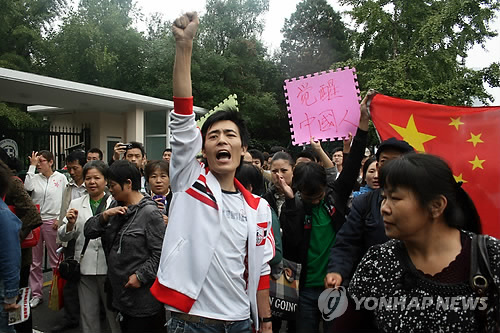<#301 View of Foreign Press>
China-Japan Territorial Dispute and Global Politics
By Kim Han-na, Tribune Reporter

Last September 8th, Japan arrested a Chinese trawler captain, Zhan Qixiong, near the East China Sea islands, called Senkaku in Japan and Diaoyu in China, when his fishing boat collided with Japanese patrol vessels. The islands, which are under Japan's administration but also claimed by China and Taiwan, are often the source of diplomatic tension for their underground resources. Japan released the captain on September 24th, but tensions between China and Japan still remain with Beijing freezing high-level summit talks. China took a strong line with Japan, canceling high-level and cultural exchanges and stopping exports of rare metals. This dispute is getting more and more serious. Let’s take a look at how the foreign press sees the dispute between China and Japan.
On October 2nd, the Asahi Shimbun, a Japanese daily newspaper, criticized China’s extreme measures to protect its maritime activity, quoting “‘aggressive tactics’ and an increase in its neighbors' inability to do anything.” It showed that Japan cannot help yielding to China, so Japan still thinks that the seas are filled with tension over China’s moves. Japan seeks payment for damages to the patrol boat and rejects China’s call for an apology. Even though avoiding a formal apology to China, Japan has adopted a conciliatory attitude for political and economical negotiations in East Asia.
Xinhua News reported on October 1st, the Chinese Foreign Ministry’s opinion that could show a good progress toward maintaining a relationship between the two countries: “China has always attached importance to developing bilateral ties with Japan.” China has stated that Japan’s response has not been satisfactory and that is why economic sanctions have been applied to the territorial dispute. At the same time, China is open to the possibilities of restoring relations with Japan.It showed the importance of the mutually beneficial relations between Japan and China.
On September 24th, Cable News Network (CNN), a U.S. news channel, also reported “the U.S. is walking a tightrope over a diplomatic dispute between the aggressive giant China and its alliance with Japan.” It pointed out that the U.S. has supported Japan as its closest ally in the region and sees this dispute as an opportunity to build security ties. The U.S. stated Japan has taken an official position on the claims to the islands, but it was based on U.S.-Japan security treaties.However, the U.S. needs to consider a variety of political and economic issues as China’s power and influence increases around the world. Therefore, the U.S. is watching the tension between China and Japan very carefully.
Kommersant, a Russian daily newspaper, quickly reported the news about this case. “Japan‘s relations with Russia remain hindered by a territorial dispute involving four Russian-held islands off Hokkaido that the Soviet Union occupied at the end of the World War II.” It showed that Russia is presenting a united front with China in their claims over Japanese territories through a joint statement on World War II. According to the report, Russia, which has a territorial dispute with Japan, is monitoring the situation in hope of currying favor with Beijing as it eyes its neighbor’s huge appetite for energy.
According to the coverage of foreign presses, allies of the two countries are divided by their own interests in achieving dominance in the East Asia region. The allies are divided into two parts; one supports China, the other supports Japan. At the same time, they keep an eye on exchange rates between the two countries, so their recent actions have been conciliatory. The regional dispute between China and Japan promises to continue for awhile. Meanwhile, South Korea has endeavored to maintain the peace in North-East Asia. If the situation is not resolved soon, this dispute will threaten the stability and prosperity of the region. Also, this regional dispute provides a lesson for Korea. Dokdo specialists should investigate the region’s history and the Korean government needs to clearly summarize the research results so that Korea can counter appropriately and respond to any challenges by Japan. Korea needs to be thoroughly prepared with factual, historical and legal arguments.
김한나 기자
jan_story@naver.com

